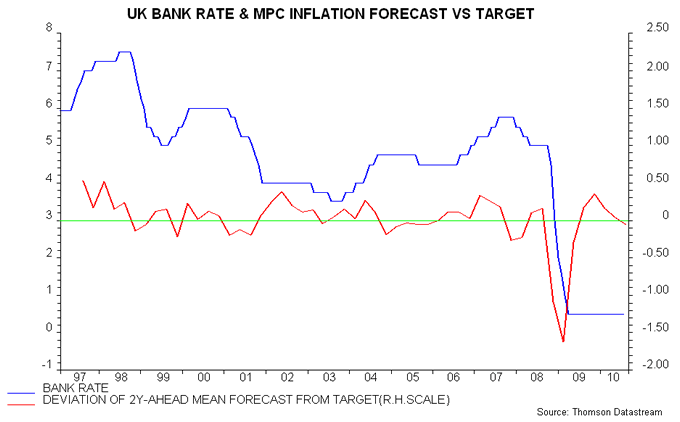The useful information in each Inflation Report is summarised by a single statistic – the Bank of England's mean forecast for inflation in two years' time based on unchanged policies. The deviation of this forecast from the 2% inflation target is a measure of the MPC's bias to tighten or loosen policy. (The rest of the Report contains much interesting material but has rarely proved useful, based on the Bank's forecasting record.)
The mean two-year-ahead forecast in the May Inflation Report was 2.04%, indicating that the MPC intended to maintain current policy for some time while envisaging an eventual need for very modest tightening. The projection appears to have been lowered to just below 2.0% in the August Report, judging from the fan chart (the Bank refuses to publish numbers until a week after the Report itself). The MPC, therefore, is signalling continued near-term inaction but now views further easing – presumably in the form of additional asset purchases – as marginally more likely to be necessary than any tightening.
This change has occurred despite inflation again overshooting the Bank's forecast three months ago by a significant margin. The new fan chart suggests that inflation will average 3.0-3.1% in the current quarter, up from 2.6% projected in May. This overshoot is strong prima facie evidence that spare capacity has failed to exert the disinflationary influence expected by the Bank but the capacity argument was again wheeled out by Governor King as a favoured deus ex machina to justify his continued assertion that inflation will eventually fall back to below the target.
As widely expected, GDP growth projections for 2011 and 2012 were lowered, with the fan chart suggesting a mean forecast on unchanged policies of about 2.4% next year versus 3.1% in May (note, though, that 2010 has been revised up from 1.4% to 1.5-1.6%). However, the reasons given for the downgrade – recent weaker surveys, tighter-than-expected credit conditions and larger-scale fiscal tightening – are unconvincing. The Governor himself argued that the fiscal effect was marginal while evidence on credit conditions has been mixed – the CBI's July survey of smaller manufacturing companies reported that the percentage of firms citing credit or finance as a constraint on output had fallen back to its long-run average.
The suspicion is that the MPC has been spooked by double-dip talk and has taken the opportunity to lower an over-optimistic previous growth forecast, with this downgrade providing a fig-leaf for maintaining the projection of a large fall in inflation over the medium term. Policy inaction can, thereby, be justified for a while longer, to the relief of Chancellor Osborne. The Bank, however, may face a rendezvous with reality later this year as the economy defies double-dip pessimism and a continued inflation overshoot leads to a further "unanchoring" of inflationary expectations.